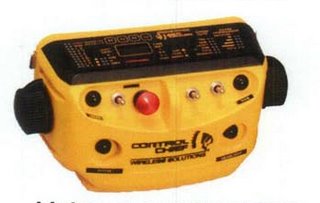The state of Indiana has given up on the one thing that proved they may be smarter than the rest of the country.
They've adopted Daylight Saving Time. Congratulations, Indiana. You're just as foolish as the rest of us.
I spent several months working in Indiana, long enough to be there when the county I was working in switched to EDT and the county I was staying in remained on EST. It's not really that confusing. It's only an hour, after all. Try coordinating with a company on the west coast sometime. Those lazy bums don't wake up until noon, and they don't return your calls until dinner time!
Somebody ought to do a study on the economic impact of
Daylight Saving Time. How much money do we spend twice a year, just to change all the clocks? How does it affect worker productivity? I doubt that there is any actual benefit to DST. But, You could ask the advocates what they think:
Energy use and the demand for electricity for lighting homes is directly related to the times when people go to bed at night and rise in the morning. In the average home, 25 percent of electricity is used for lighting and small appliances, such as TVs, VCRs, and stereos. A good percentage of energy consumed by lighting and appliances occurs in the evening when families are home. By moving the clock ahead one hour, the amount of electricity consumed each day decreases.
In the Summer, people who rise before the sun rises use more energy in the morning than if DST was not in effect. However, although 70 percent of Americans rise before 7:00 a.m., this waste of energy from having less sunlight in the morning is more than offset by the savings of energy that results from more sunlight in the evening.
There is a public health benefit to Daylight Saving Time, as it decreases traffic accidents. Several studies in the U.S. and Great Britain have found that the DST daylight shift reduces net traffic accidents and fatalities by close to one percent. An increase in accidents in the dark mornings is more than offset by the evening decrease in accidents.
Are they honestly suggesting that I watch less TV, listen to less music, or (eek) blog less over the summer? Sorry, dudes, I'm still going to wash my clothes, run the stove, and take as many (or more) showers during the summer. In fact, I'll also be running my air conditioning NIGHT AND DAY. My energy usage may be time dependent, but it's constant. You've only offset it by an hour.
It looks like Aaron and I need a Point Counterpoint on this one.Awhile back Marshall Brain answered a question on how much gasoline would be spent if the U.S. made Daylight running lights mandatory.Well he came up with a figure of $600 million dollars to run daylight running lights.That was at $1.50 a gallon. I said that it was a while back.Well in 2006 I don't have an exact figure, but I would say that more than half of the cars on the road do not have daytime running lights.The drivers have to turn on the lights when they need them.Without daylight savings time, the lights would go on one hour sooner.Even if I divide Marshall brains' figue by 24, thats $25,000,000.00.Yes there will be a few early morning drivers that need to use headlights in the morning, but it is negligible compared to evening drivetime.


